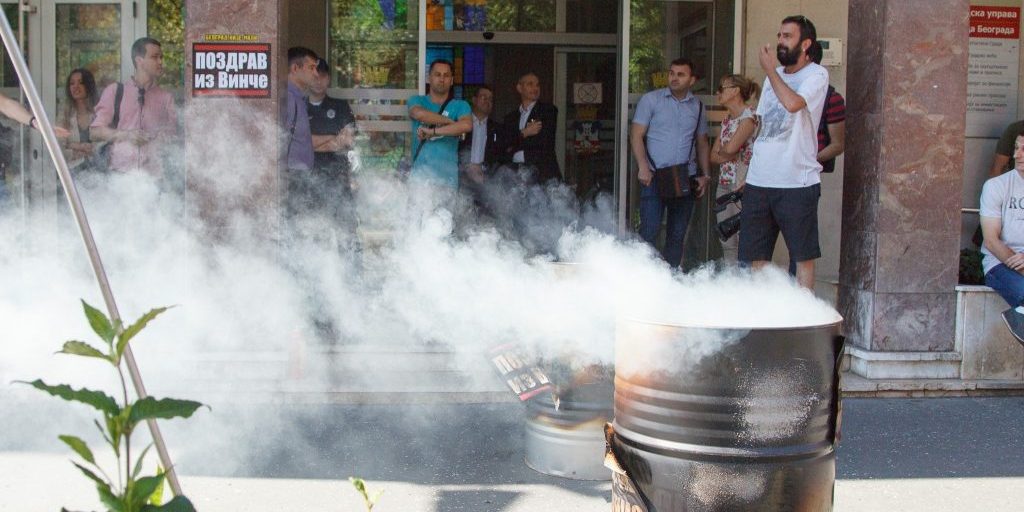The Ne Davimo Beograd initiative has this week challenged a decision by the Ministry of Mining and Energy to grant feed-in tariffs to Beo Čista Energija d.o.o. for the planned Vinča waste incinerator in Serbia, to be financed by the EBRD, IFC and Austrian development bank OeEB.
Aleksa Petkovic, Ne Davimo Beograd | 15 October 2019

Protest in front of the city administration
In a surprising move, last week an article announced that operating subsidies for the planned Belgrade incinerator had been approved.
Only a week had passed since the Ministry of Environment’s decision to approve the incinerator’s environmental impact assessment (EIA), and the project was supposed to obtain a construction permit and a confirmation on the start of works before applying for subsidies.
It’s not often that a state institution works with such lightning speed as to issue so many approvals within less than a week, so we started digging to see what had happened.
Construction permit prejudices environmental assessment outcome
It turned out that the Ministry of Transport, Construction and Infrastructure had approved a construction permit for the project back on 16 August, without waiting for the decision on whether the EIA had been approved by the Ministry of Environmental Protection. This permit was then used to apply for approval for operating subsidies under Serbia’s renewable energy support scheme, which were then approved on 27 September, before the EIA decision was even made.
Not only did this process seriously prejudice the outcome of the EIA process, but it also meant that Beo Čista Energija’s application for subsidies should not have been approved, as it was incomplete.
Why is an incinerator getting renewable energy subsidies anyway?
As the world becomes more sensitive to the damage caused by plastics and the EU ramps up its efforts to reduce waste, it is baffling to see Serbia approving feed-in tariffs for a waste incinerator, under the guise of renewable energy subsidies. This is clearly destimulating waste prevention and recycling and encouraging Belgrade to burn its trash.
The planned scheme is also, in our opinion, illegal under the Energy Community Treaty, in which Serbia committed to implement the 2009 EU Renewable Energy Directive by the beginning of 2014. The Directive does allow the incentivisation of energy produced from biomass, and defines biomass as including the biodegradable fraction of industrial and household waste, but it does not allow subsidies for non-biodegradable waste like plastics, let alone the diesel auxiliary fuel that will be used in the incinerator to help with ignition.
However, in the Ministry of Energy and Mining’s decision to approve the incentives, there is no information to suggest that anything less than the entire output of the plant will be supported. Serbian law also allows incentives for “waste-fired power plants”, which are defined very vaguely, but clearly include more than biodegradable waste, which is included separately under “biomass power plants”.
The EU starts learning from its mistakes… and Serbia?
Within the EU, steps have been taken to try to prevent incentives for burning biodegradable waste crowding out waste prevention and recycling. The new Renewable Energy Directive II, which entered force in 2018, prohibits states from granting support for renewable energy produced from the incineration of waste if the EU’s increasingly strict separate waste collection obligations have not been complied with.
The whole model of feed-in tariffs for renewable energy has also been replaced with a more cost-efficient model based on auctions and premiums across the EU, and the European Commission has advised Member States to phase out financial support for energy recovery from mixed waste.
Frustratingly, Serbia is once again out of step with EU moves to become a more efficient and sustainable economy, delaying inevitable changes in its renewables subsidies system and supporting a waste management system that is in some ways less progressive than the one it had 30 years ago.
More frustrating still, it is being supported by the European Bank for Reconstruction and Development, the International Finance Corporation, and apparently also Austria’s OeEB to do so. Is it really so much to ask that international banks stop supporting projects based on illegal and discredited income models and instead help Serbia move towards a circular economy?
Never miss an update
We expose the risks of international public finance and bring critical updates from the ground – straight to your inbox.
